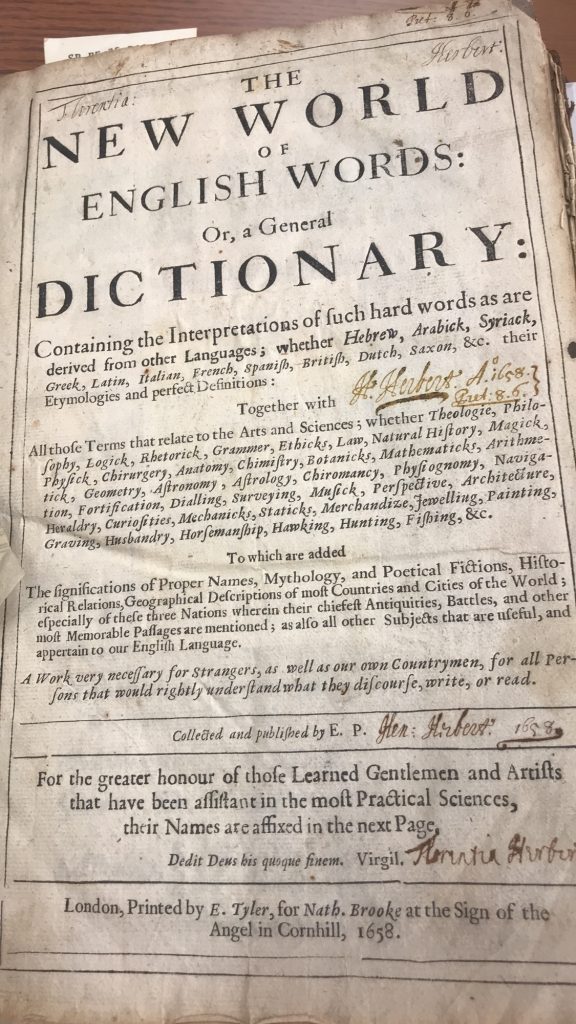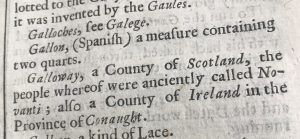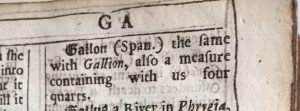Remember when Blount professed that he has “done little with his own pencil”? (see Blount’s Working Methods). Well, his acknowledgment of indebtedness to early lexicographers was unusual in his time. Lexicographers have always stolen each other works without Blount’s openness.
This brings me to summarize what Lynch, an editor of Samuel Johnson’s dictionary, calls one of the most bloodthirsty lexicographical rivalries. In 1658, only two years after Glossographia’s first edition, Edward Phillips published A New World of English Words: or a General Dictionary, containing the terms, etymologies, definitions and perfect interpretations of the proper significations of hard English words throughout the Arts and Sciences, liberal and mechanic. Phillips’ work was met with even greater success, but what prompted Blount’s ire was the fact that Phillips lifted many entries from Glossographia without even mentioning Blount. Now, Edward Phillips was John Milton’s nephew. Knowing Blount’s background, it can be said that part of Blount’s fury can be attributed to not only being plagiarized, but also being plagiarized by a Puritan.

Phillips’ rival dictionary, 1658 edition
Between 1658 to 1673 Blount openly denounced Phillips’ plagiarism, though his denunciations failed to lessen his rival dictionary’s popularity nor did they prevent Phillips from pillaging other dictionaries in his later revisions. In response to Phillips’ work, Blount wrote: A World of Errors Discovered In The New World of Words. The gist of his accusations was that Phillips copied his entries entirely, and wherever Phillips was original, he made it worse.
Examples of Blount’s scathing commentary:
- “A Gentleman . . . writes a Book, and the Book happens to be acceptable to the World and sell; a Book-seller . . . instantly employs some Mercenary to jumble up another like Book out of this, with some Alterations and Additions, and give it a new Title. . . . Thus it fared with my Glossographia, the fruit of above Twenty years spare hours.”
- “In perusing this Dictionary, you may find some words twice explicated, and those too, with different Interpretations, where one must necessarily be false. Such are Dancet and Dansette; Dodkin and Dotkin; Jotacism and Herbert twice; Ockham and Okum; Rere-County and Rier-County; Varry and Verrey, with divers others. It seems our Authors memory also failed him, or he did not understand them to be the same.”
Blount also makes corrections to Phillips’ definitions. Phillips, for instance, defined “gallon” as a measure containing two quarts, to which Blount remarked: “Our Author had better omitted this word, since every Alewife can contradict him.”

“Gallon”- The New World of Words 1658 edition
Here’s Blount’s definition of “gallon”:

“Gallon”- Glossographia 1661 edition
Dictionaries have been lifting material from one another, as demonstrated in Lynch’s article on “Four and a Half Centuries of Lexicographical Belligerence.” Lifting entries from a rival dictionary, however, was always looked down upon. Competition and mutual surveying have been prevalent throughout the history of dictionary-making. Although the feuds between rival compilers were sometimes petty, they give insight into how documenting and authenticating language mattered to those who undertook such labor, and we are indebted to the continuous cataloging of our living language.
